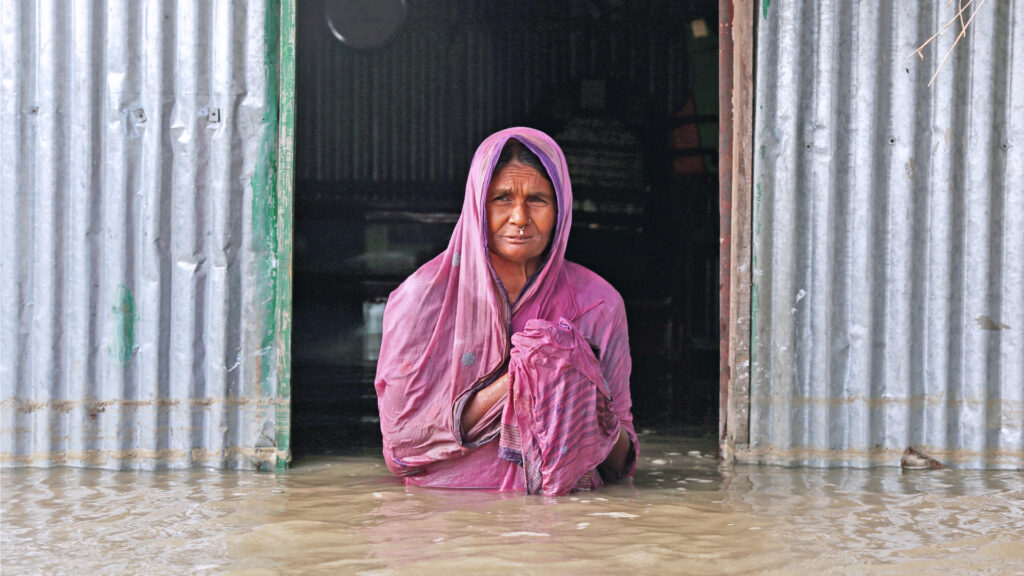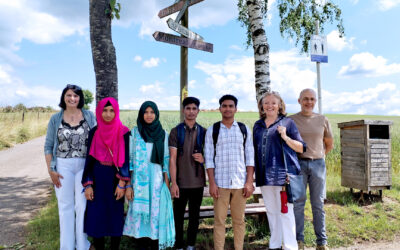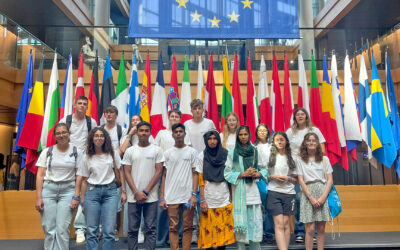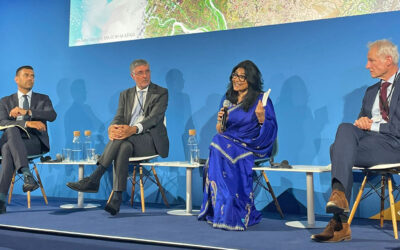Adverse climatic events such as floods entrap char residents in lifelong debt, often exposing them to adversities from creditors

By Tahmeed Chaudhury
May 8, 2024
Md. Shah Jamal, 45, dreams of a year when he would not have to dismantle his house and reassemble it on another piece of land, something he has been forced to do for five consecutive years. His ancestral village Kheyar Alga, a remote, disaster-prone and shifting sedimentary island in the middle of the Brahmaputra River in northern Bangladesh, frequently erodes into silt every year when flood hits.
“The land I inherited from my father is underwater,” said Shah Jamal. “Since my indigenous land was destroyed a little over five years ago, my family, along with many others in the community, have been moving every single year.”
Kheyar Alga has since become the name of any island the community moves to when the one they are inhabiting crumbles. When the land beneath their home erodes away, they move to an adjacent, uninhabited island and also name it Kheyar Alga. The people find themselves wedged in the middle of turbulent waters that only get more savage when the torrential tropical rains fall, causing the water to swell and surge into low-lying areas.
The frequent displacement and migration exert heavy financial burdens on the people, who are barely able to get back on their feet before another flood arrives and takes whatever they have rebuilt away. The cycle of persistent building and rebuilding often drives families into poverty, with many confined to debts that only keep growing.

When I visited the then-Char Kheyal Alga during the 2022 floods, I found people living on boats as the entire island had been submerged. The community people were living in dire circumstances, with entire families crammed into boats, using a secluded, out-of-sight spot in the river as a toilet and boiling water from the same river for consumption. That land had eventually eroded away, with the communities then moving to this one.
“Since I lost everything, I had to lease this land on loan (referring to the one where he built a small home for himself, his wife and two sons),” said Shah Jamal. “As a farmer, my only source of income is through seasonal farming on other people’s paddy fields, which does not bring me enough money to sustain my family.”
Neck deep in poverty, Shah Jamal had little option than to take loans from multiple sources to pay for his living, including basic necessities such as food, leasing land and paying for his children’s education, as well as for frequent disaster rehabilitation such as shifting homes, boat transportation and to rebuild. The ‘sources’ Shah Jamal loaned money from are prominent loan sharks known as Dadon Bebshayis (loan profiteers), who lend money on interest to people affected by natural disasters and poverty who are unable to have access to mainstream financial institutions or banks.
Shah Jamal has a debt of BDT 90,000 looming over him most of which he does not have the means to pay back. “My creditors frequently threaten me with violence and theft of possessions. On this land, I built two corrugated tin-roofed houses, one to live on and another as kitchen. They took the structure of my kitchen away,” he said, pointing to the area where his kitchen lay, remnants of which, bamboo and bricks, are still scattered. He worries they will come back to take the remainder of his house away, a single room which houses his family as well as their kitchen. “They even threatened to take my wife away.”

55-year-old Nadu Sheikh, also a resident of Char Kheyar Alga, has lost count of the amount of money he owes to loan sharks. He took out a loan from a microfinance institution for his daughter’s marriage and when he was unable to repay, he was threatened with legal action. “The only people who could give me money at that point were Dadon Bebshayis (loan sharks),” he said. Then unable to repay the first loan shark, he took out a loan from another to repay the first one, subsequently loaning from a third loan shark to repay the second one. Thus, he fell into a loop. “What do I do, or where do I go when I have to manage food and shelter for my family and on top of that, repay my creditors?”
Md. Shah Alam, 43, a farmer in the same village, is regularly threatened by aggressive loan sharks who get money from him. He had to shift homes 15 times in his lifetime and recently pulled his only son out of school due to poverty. “I took loans out of desperation, and I can’t get to the end of it,” he sighed.
Jahurul Islam is a Friendship Community Paralegal at Char Kheyar Alga and somewhat of a guardian to people in the community. He said, “Our homes have been destroyed consistently in the five years. There are people way below the poverty line, and they need money to survive,” he said. “The Dadon Bebshayis prey on disaster-affected and poverty-stricken people.”
After several attempts, I succeeded in reaching out to a loan shark. Based in Kurigram, Sekandar Ali makes a living out of loan profiteering and has provided loans to many climate-impacted people in distress and poverty. “We try to help them financially, to keep them afloat,” remarked Sekandar. “I believe what we do is an act of humanity, because no other people or institution, including banks, want to give money to the poor.”

However, when asked about the aggression or extreme measures taken when one can’t pay back, he seemed uncomfortable with the question. “They never pay back on time, and we always give them consideration and give them extra time,” he said, clearly agitated. “We increase the period to up to six months before taking action. Yet, they don’t pay. They come to us because they have no other choice, and when we help them with large loans, they make false promises and hide and ignore us. We are often forced to take extreme measures.”
In 2022 alone, adverse events caused by climate change amounted to USD 400 billion in loss and damage. The Bangladeshi poor spend 2 billion USD a year, out-of-pocket—double of the government and aid agencies put together—to recover from climatic disasters. Yet, in COP 28, developed nations pledged only USD 700 million for loss and damage payments, only a tiny fraction of the loss and damage incurred in a calendar year.
According to the Global Climate Risk Index (2021), Bangladesh is the seventh most climate-impacted country in the world, with disasters such as floods, cyclones, tidal surges, etc. increasing in consistency and ferocity each year, and causing damage worth billions. While the world refuses to take financial liability and yet, continues to depend on fossil fuels for energy, it is people like Shah Jamal who lose all they have, and ponder if they will ever be able to get back on their feet.
“The challenge for the newly established Loss and Damage Fund is to design a mechanism to deliver funding to local communities, as agreed at COP28 in Dubai,” says Professor Dr Mizan R Khan, Technical Lead of the LDC Universities Consortium on Climate Change (LUCCC) at Independent University, Bangladesh and former deputy director at the International Centre for Climate Change and Development (ICCCAD), Bangladesh. “This will be the real test of the Loss and Damage Fund, hosted by the World Bank.”



